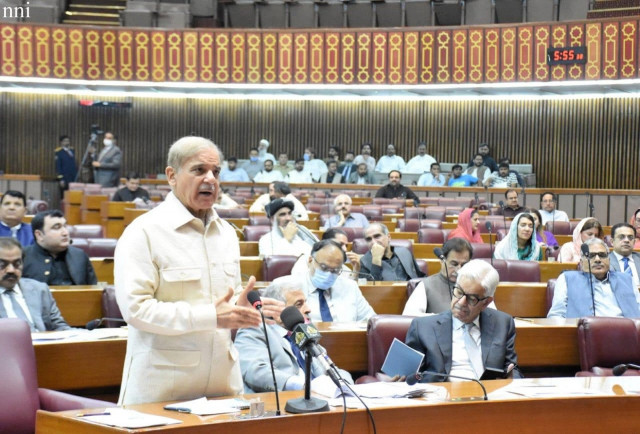NA moves to ruffle judiciary’s feathers
Shehbaz says there shouldn’t be ‘double standards’ of justice in Pakistan

A day after the Supreme Court annulled Punjab Assembly Deputy Speaker Dost Muhammad Mazari’s ruling on the chief minister’s election, the National Assembly unanimously passed a resolution regarding judicial reforms.
A session of the lower house was held under the chairmanship of Speaker Raja Pervaiz Ashraf.
LIVE #APPNews : Prime Minister Shehbaz Sharif expressing his views National Assembly #Islamabad @NAofPakistan https://t.co/W3CFQoGpE0
— APP 🇵🇰 (@appcsocialmedia) July 27, 2022
During the meeting, Law Minister Azam Nazeer Tarar presented a resolution for setting up a parliamentary committee for judicial reforms.
The minister said that legislators have been assigned the duty of legislation, and the legislature should implement it while the judiciary should decide on it. He added that one body cannot interfere in the matters of another body, and nobody can be allowed to take over the parliament.
“Judicial reforms are the need of the hour,” he added.
Earlier, in his address on the floor of the house, Prime Minister Shehbaz Sharif said that his predecessor Imran Khan tried to dissolve the assembly “fraudulently” in March, and he, along with the president and deputy speaker of the lower house, violated the constitution, but nobody summoned them.
“But the deputy speaker of Punjab was called,” he pointed out, adding that there should not be double standards of justice in the country.
The premier said that in the past whenever he was called to the court he would go respectfully. “If there is no justice, then the country cannot move forward; there should not be double standards of the judiciary,” he added.
“The parliament was attacked in 2014, dirty clothes were hung on the Supreme Court [but] no one noticed,” he said.
“The situation is difficult, but we will make Pakistan great,” he remarked, adding that he will fight Imran’s “fascism” but will not bow down to anyone.
“As long as my leader and allies trust me, I will continue to work,” Shehbaz said.
Foreign Minister Bilawal Bhutto-Zardari, in his speech, said that there cannot be one constitution for the coalition partners and another for “ladla” – a term used by the opposition to mock Pakistan Tehreek-e-Insaf (PTI) chairman for being allegedly favoured by the establishment.
Read Sanaullah threatens governor's rule in Punjab
He said that the role of the establishment and judiciary should not be controversial. “[Article] 52-B is not with the president, the new 58-B has gone to the court,” he remarked.
He asked whether the sin of 70 years of constitutional violation could be forgiven over the neutrality of one night. He, therefore, demanded a joint parliamentary committee for judicial reforms, saying that his party was ready for it.
“A joint parliamentary committee should be formed in which we will legislate, we will decide how many judges should sit on the bench, if we want to pass a decision on the speaker’s ruling then God-willing, all the judges will have to be seated,” he added.
The foreign minister, who is also the chairman of the Pakistan People’s Party (PPP), said that passing the 19th constitutional amendment was a “mistake” made by their previous government.
“We were threatened to pass the 19th amendment or else the 18th amendment would have been suspended,” he claimed. “We gave in to the threat and passed the 19th amendment.”
He said that at that time their government should have stood up to those who threatened them.
Apart from this, during the parliamentary session, Minister of State for Law Shahadat Awan presented the bill for the second amendment in the National Accountability Ordinance, 1999, saying that the standing committee should be instructed to finalise the bill in two to three days.
“In many cases, accountability courts have difficulties, which need to be overcome,” he said.
According to the draft of the bill, the National Accountability Bureau (NAB) will not be able to investigate corruption cases of less than Rs500 million. Moreover, the tenure of the prosecutor general of the anti-corruption body can be extended by three years.
Furthermore, Section 16 and 19E of the NAB law are being amended to make it mandatory to try the accused in the same area where the offence was committed.
The bill also curtails the bureau’s authority to conduct surveillance through the help of the high court. Similarly, the anti-corruption watchdog would not be able to take the help of other government agencies for investigation. Moreover, it makes it mandatory to inform the accused of the charges against him so that they can defend themselves in court.
The amendment also exclusively grants the federal government the power to appoint judges of the accountability courts.
Lastly, Section 31B has been amended to enable the NAB chairman to recommend the disposal of a reference filed in the accountability court before the indictment.



















COMMENTS
Comments are moderated and generally will be posted if they are on-topic and not abusive.
For more information, please see our Comments FAQ